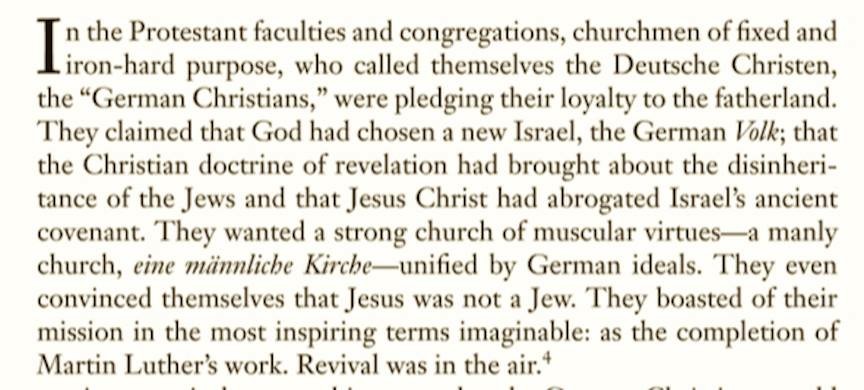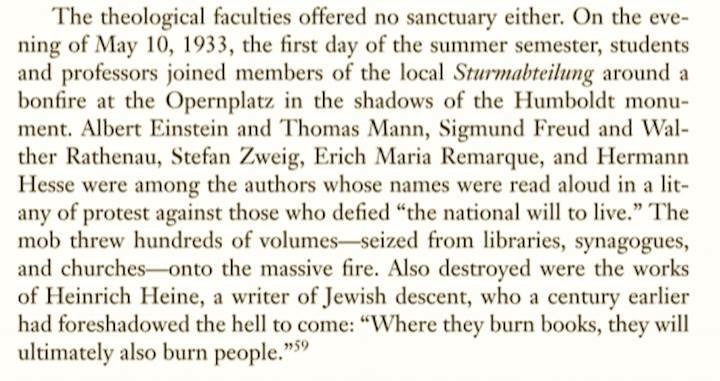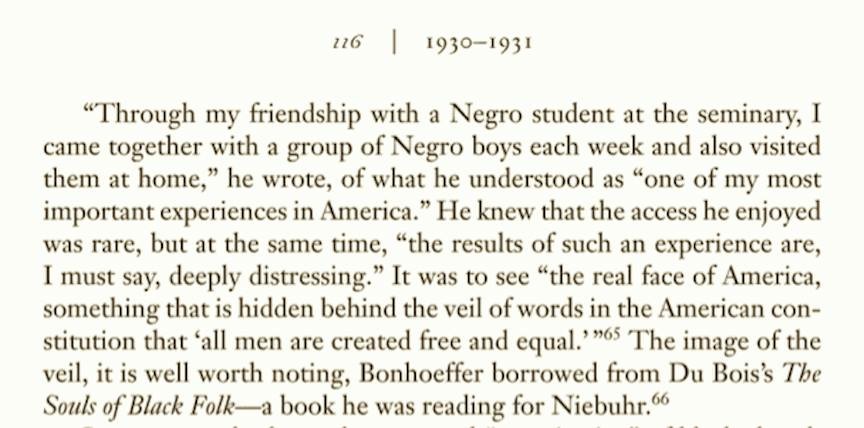As head of Public Religion Research Institute (PRRI), Robert P.
-
@i_gvf I think there's reason for a lot of us to be afraid now.
-
@wdlindsy They. Are. All. White.
-
@wdlindsy Note that “German Evangelical Church" in this context means German Lutheran, not Evangelical in the American sense. Roughly 1 in 6 German Lutheran pastors were part of the Confessing Church, rejecting Nazification. Of these, roughly 1 in 4 were arrested in 1935 (per Wiki article on the Confessing Church). I hope we'll do better this time.
-
@oldprof Having give several seminars at the Missionsakademie an der Universität Hamburg, I do have some familiarity with what the word Evangelisch. I'm afraid Charles Marsh's damning report of the behavior of too many German Protestant leaders as Hitler came to power is sadly accurate. These passages are from his wonderful biography of Bonhöffer, Strange Glory: A Life of Dietrich Bonhoeffer (NY: Knopf, 2014).
/1


-
William Lindsey :toad:replied to William Lindsey :toad: last edited by
And, of course, the behavior of many Catholic leaders during that period in Germany cannot be overlooked, either. Johannes Baptist Metz is very clear on that point as he writes about coming of age in an all-Catholic Bavarian village in the Nazi years.
/2

-
@Paxil Yes.
-
@wdlindsy The claim that 1 in 6 German Lutheran Pastors were part of the Confessing Church recognizes that 5 in 6 were not. Part of my experience is a sense of residual guilt over Lutheran complicity in the Holocaust. I've read several bibliographies of Bonhoeffer, but not yet Marsh's. I'll add it to the list. Let me counter with a recommendation of “Bonhoeffer's Black Jesus," which deals with his year in the US, and his embrace of the Black Church here during that year. It's timely.
-
@oldprof Thank you. Yes, Bonhoeffer's Black Jesus is wonderful, opening up important vistas on how Bonhoeffer's experience with the Black church when he was at Union Seminary was formative for him. This is something Marsh's excellent biography discusses at length: see the excerpt below. M. writes,
“By the mid-1930s, singing the Negro spirituals and listening to recordings of them would become a vital part of the dissident circles in Germany that gathered around Bonhoeffer” (pp. 118-9).
/1
-
William Lindsey :toad:replied to William Lindsey :toad: last edited by
And:
“‘We must take the trouble to go off far enough to hear the Word again,’ Barth implored.
Bonhoeffer now knew himself able to go that distance, for, as he said, ‘I heard the gospel preached in the Negro churches’” (p. 134).
/2
-
Stephanie Moorereplied to William Lindsey :toad: last edited by
@wdlindsy I keep saying to my SO that one group I’m most upset with are the pastors at so many churches who have turned their churches into political engines where they can’t even teach the beatitudes any more lest it upset their members, and social isolation is used to pressure people into conforming. It’s rather perverse.
-
William Lindsey :toad:replied to Stephanie Moore last edited by
@StephanieMoore Any of us who still find some value in the Christian tradition and message surely do need to be appalled at what these folks are doing to it, how they're trashing it and bringing it into total disrepute.
